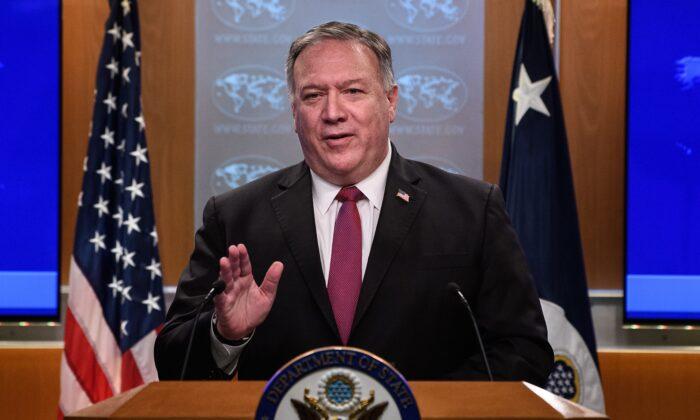The report, titled “U.S. Investors Are Funding Malign PRC Companies on Major Indices,” lists the names of publicly traded companies that present a national security threat to the United States.
“The Chinese Communist Party’s threat to American national security extends into our financial markets and impacts American investors,” the fact sheet says.
Many major stock indexes developed by index providers Morgan Stanley Capital International (MSCI) and Financial Times Stock Exchange Group (FTSE) include Chinese companies that are blacklisted by the Pentagon and the Department of Commerce.
MSCI and FTSE Russell are among the largest index providers in the world that influence how investors deploy their funds. Securities of many Chinese companies are embedded in exchange-traded funds (ETFs) and other passive investment funds benchmarked against these major indexes.
The pension assets of American workers and retirees are supporting these Chinese companies as a majority of pension funds use the MSCI Emerging Market (EM) index as their investment benchmark, according to the fact sheet.
According to the fact sheet, at least 22 of these military companies have affiliates whose securities are included on the MSCI EM index or FTSE Emerging index. Some of them also have bonds that are included in the Bloomberg Barclays Global Aggregate Bond index.
China’s biggest telecommunications giants, China Mobile Ltd. (0941.HK) and China Telecom Corp. (0728.HK), are also on the list and their stocks are traded on both the Hong Kong Stock Exchange and the New York Stock Exchange (NYSE).
The fact sheet also provides the list of all 68 affiliated entities of these military companies. Most of them have stocks that are included in various MSCI and FTSE indexes.
“Under Chinese law, Chinese companies and researchers must—under penalty of law—share technology with the Chinese military. The goal is to ensure that the People’s Liberation Army has military dominance,” Secretary of State Mike Pompeo stated in the fact sheet.
In addition to the military companies, at least 13 PRC firms on the Commerce Department’s blacklist (Entity List) had affiliates or parent companies included in the MSCI or FTSE indexes.
Hangzhou Hikvision, Dahua Technology, IFLYTEK, and FiberHome Technologies Group are prominent examples of Chinese companies “with widely recognized ties to the oppression of Uyghurs that benefit from inclusion in the MSCI and/or FTSE stock indices,” according to the report.
In addition, “the MSCI emerging market index included 230 A-shares Chinese stocks incorporated on the mainland, quoted in renminbi, and listed on Chinese Communist Party-controlled Shanghai and Shenzhen exchanges.”
MSCI and FTSE didn’t immediately respond to requests by The Epoch Times for comment.
“Some of the Chinese companies (on MSCI Index) present significant national security and humanitarian concerns for the United States, which increases the risk that they could be subject to sanctions, public protests, trade restrictions, boycotts, and other punitive measures that jeopardize their business and profitability,” White House national security adviser Robert O'Brien and White House chief economic adviser Larry Kudlow stated in the fact sheet.
The U.S. House of Representatives last week unanimously passed legislation that will block Chinese companies from the U.S. stock market if they fail to be transparent and meet American accounting standards. The measure is headed to President Donald Trump’s desk to be signed into law.
The bill affects companies listed on U.S. exchanges, but it doesn’t address issues related to securities embedded in ETFs and other passive investment funds benchmarked against major indexes.
The index provider, as a result, had to increase the weighting of Chinese shares in its global benchmarks, leading billions of dollars to flow into Chinese shares, the report said.





